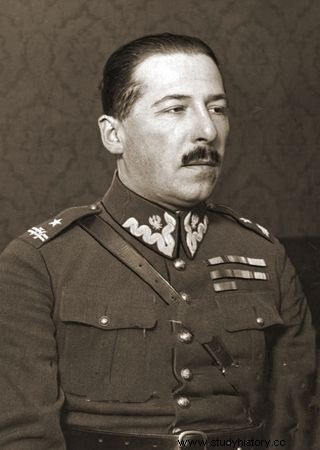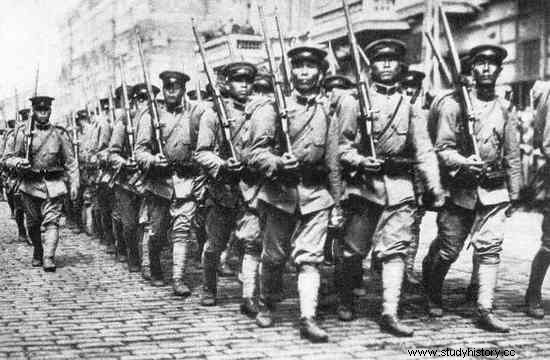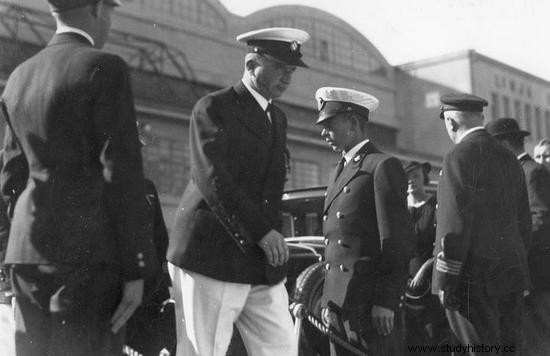Japan lagged far behind other countries in terms of cryptography at the beginning of the interwar period. Its land army in particular was extremely lagging behind in this area. The situation, uninteresting for the Japanese, was only changed in the 1920s thanks to the help of our cryptologists, who showed considerable skills already in the Polish-Bolshevik war.
The Japanese have long realized that their cryptology methods leave much to be desired. The members of the General Staff of the Land Forces associated with the intelligence were particularly well aware of this.
Captain Yamawaki Masataka, who was representing the Japanese General Staff, who had been in Poland for a long time, decided to use his good contacts with representatives of the Polish army and lead to permanent cooperation between our staffs.

Captain Kowalewski. The man who taught the Japanese to break codes. Jan Kowalewski. The man who taught the Japanese to break codes (already a major in the photo).
In the longer term, he wanted the Poles to train Japanese cryptologists. Despite the great opinion he gave to our side, he initially met with the reluctance of the head of the Japanese II Division, Brig. Itami Matsuo.
According to the account left by the captain, the superior then said: how can first-class land forces learn from the army of third species . Nevertheless, approval was finally given, although the Japanese generals did not shake off their doubts.
Conversations in Dairena
Poles, however, did not have to wait long for an opportunity to demonstrate their cryptology skills. All thanks to the talks that the Japanese had with the representatives of Soviet Russia in Dairena at the turn of 1921/1922. Naturally, a certain group of Japanese intelligence officers were also delegated to them, tasked with decoding the cables intercepted from the Russian capital.
However, poor training soon became apparent, and the messages remained unread. In such a situation, it was decided to send them to the Japanese military attaché in Poland. Our cryptologists dealt with the matter in a week , thus proving their high qualifications and reassuring the Japanese that they made the right choice.

In the early 1920s, the Japanese had a strong army, but their cryptologists lagged far behind other colleagues. That is why they came to train on the Vistula River. The photo shows the Japanese infantry in Vladivostok during the Russian Civil War. Photograph taken in 1921.
Thus, in 1923, Capt. Jan Kowalewski, who was to conduct a three-month course there for officers of the 2nd Division of the General Staff.
Training results…
Schedule of the short stay of Cpt. Kowalewski in Japan was extremely tense. Soon he had to teach Japanese adepts of the art of intelligence how to read various Soviet ciphers. All methods of their encryption and decryption, structures of diplomatic and intelligence ciphers, etc. were discussed.
Thanks to the visit of the Polish captain, the level of Japanese cryptography has undoubtedly increased by at least a few levels . This gave the Japanese a solid foundation for conducting their own research. But it doesn't stop there!
It was decided that successively selected officers would be sent to Poland for practical training lasting about a year. How valuable and important the cooperation with us turned out to be for the Japanese is clearly demonstrated by an excerpt from the notes of the Polish military attaché in Tokyo - Maj. Henryk Floyar-Rajchman:
Two officers, the best employees of Col. H. so that they can replace him in the future. Col. H. remembers very fondly his work in Warsaw and asks that the officers sent should work a lot and that they also receive work for the home. He noted that thanks to our help, the Japanese Staff attached great importance to the encryption work / ... / and would like to cooperate in the matters of the USSR in the future. We have the opinion that we have a higher encryption issue than anywhere else in Europe.

Major Henryk Floyar-Rajchman, Polish military attaché in Tokyo, wrote about how the Japanese were satisfied with the cooperation with our cryptologists. Pictured in white pants, already as Minister of Industry and Trade.
Finally, it is worth mentioning that the experience gained while studying in Poland paid off during the service in China, where officers trained on the Vistula managed Japanese intelligence.
